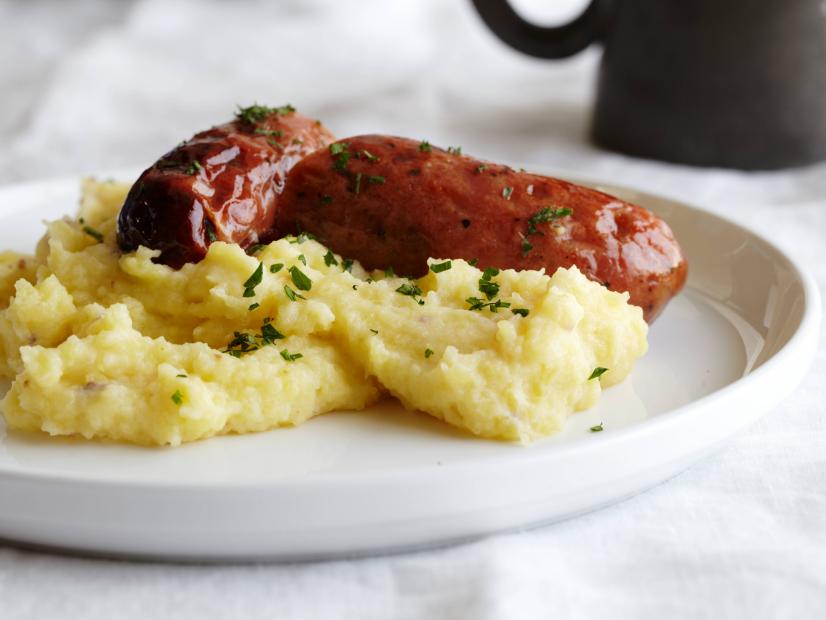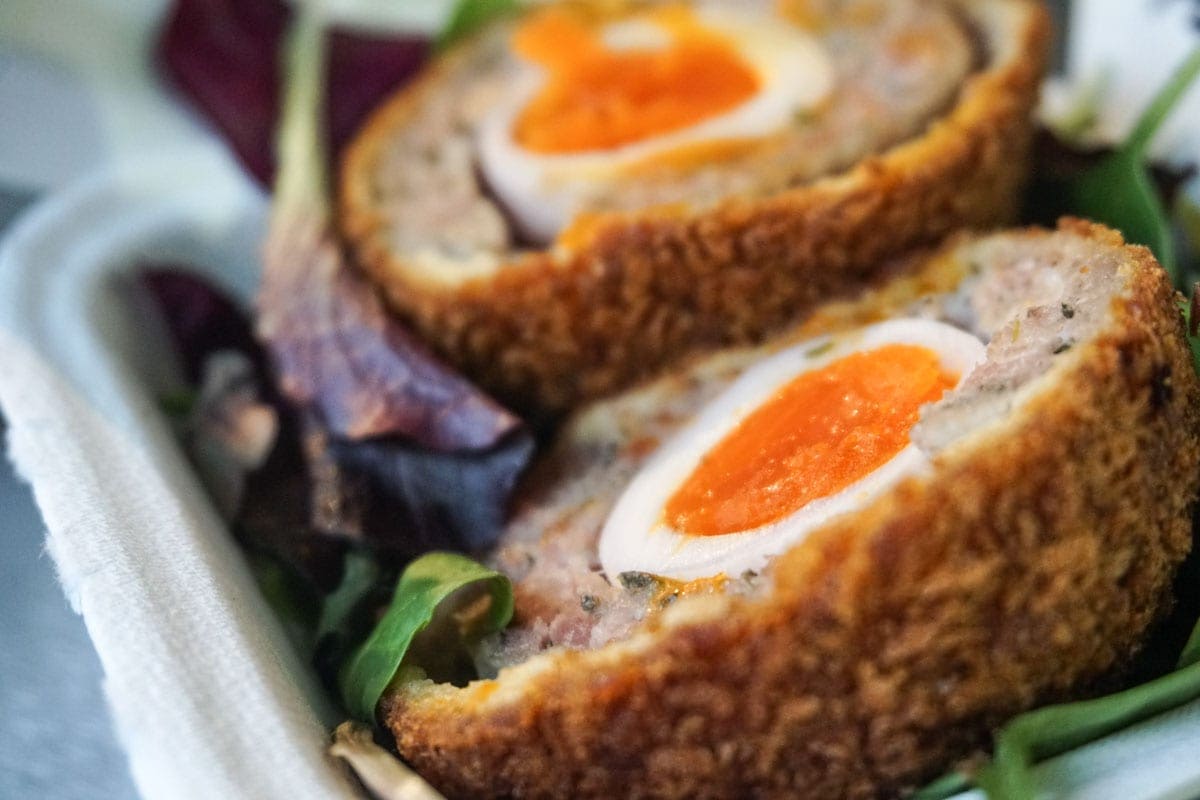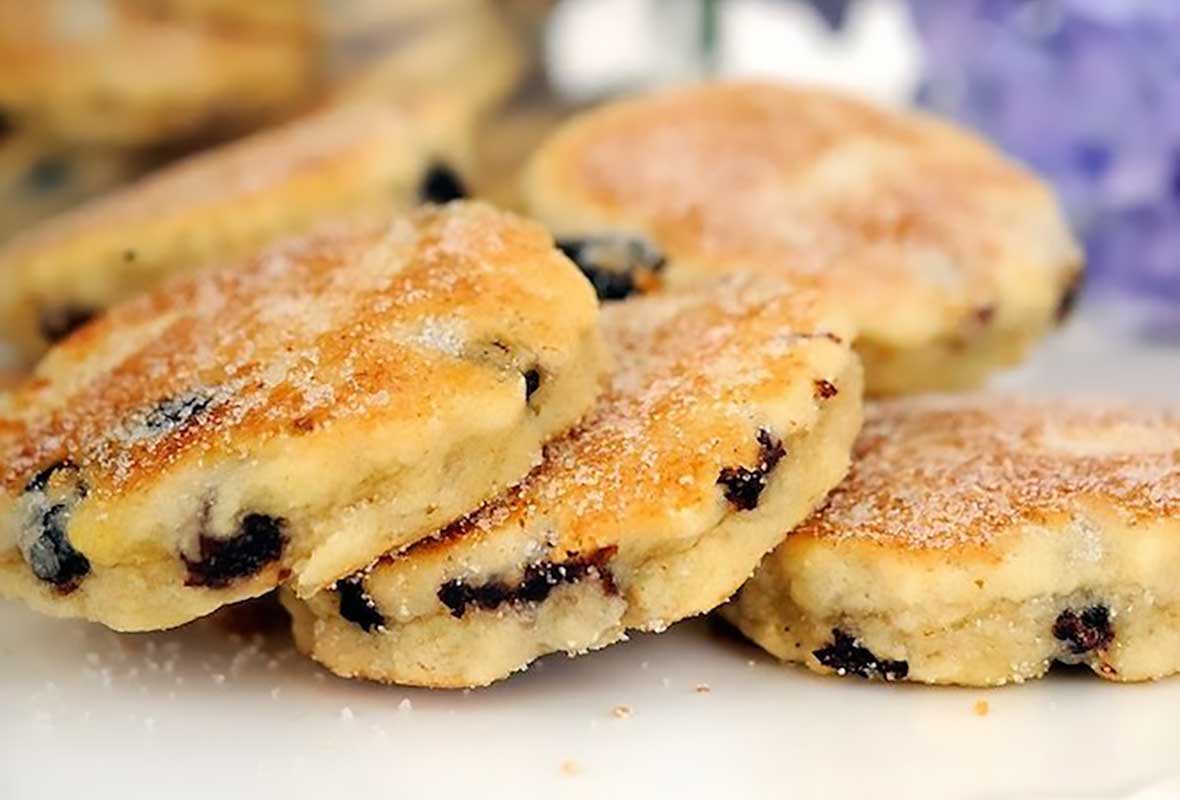British Cuisine
British cuisine is the heritage of cooking traditions and practices associated with the United Kingdom. Although Britain has a rich indigenous culinary tradition its colonial history has profoundly enriched its native cooking traditions. British cuisine absorbed the cultural influences of its post-colonial territories – in particular those of South Asia.
In ancient times Celtic agriculture and animal breeding produced a wide variety of foodstuffs for the indigenous Celtsand Britons. Anglo-Saxon England developed meat and savoury herb stewing techniques before the practice became common in Europe. The Norman conquest introduced exotic spices into England in the Middle Ages. The British Empire facilitated a knowledge of Indian cuisine with its "strong, penetrating spices and herbs".
Food rationingpolicies put into place by the British government during the wartime periods of the 20th century are widely considered today to be responsible for British cuisine's poor international reputation.Well-known traditional British dishes include full breakfast, fish and chips, the Christmas dinner, the Sunday roast, steak and kidney pie, shepherd's pie, and bangers and mash.
People in Britain however eat a wide variety of foods based on the cuisines of Europe, India, and other parts of the world. British cuisine has many regional varieties within the broader categories of English, Scottish and Welsh cuisine and Northern Irish cuisine. Each has developed its own regional or local dishes, many of which are geographically indicated foods such as Cornish pasties, the Yorkshire pudding, Cumberland Sausage, Arbroath Smokie, and Welsh cakes.
Romano-British agriculture, highly fertile soils and advanced animal breeding produced a wide variety of very high quality foods for indigenous Romano-British people. Anglo-Saxon England developed meat and savoury herb stewing techniques and the Norman conquest reintroduced exotic spices and continental influences back into Great Britain in the Middle Ages[3]as maritime Britain became a major player in the transcontinental spice trade for many centuries after. Following the Protestant Reformation in the 16th and 17th centuries "plain and robust" food remained the mainstay of the British diet, reflecting tastes which are still shared with neighbouring north European countries and traditional North American Cuisine. In the 18th and 19th centuries, as the Colonial British Empire began to be influenced by India's elaborate food tradition of "strong, penetrating spices and herbs", the United Kingdom developed a worldwide reputation[5] for the quality of British beef and pedigree bulls were exported to form the bloodline of major modern beef herds in the New World.[3] Developments in plant breeding produced a multiplicity of fruit and vegetable varieties, with British disease-resistant rootstocks still used globally for fruits such as apples.
During the World Wars of the 20th century difficulties of food supply were countered by official measures, which included rationing. The problem was worse in WWII, and the Ministry of Food was established to address the problems (see Rationing in the United Kingdom).
Due to the economic problems following the war, rationing continued for some years, and in some aspects was more strict than during wartime. Rationing was not fully lifted until almost a decade after war ended in Europe, so that a whole generation was raised without access to many previously common ingredients. These policies, put in place by the British government during wartime periods of the 20th century,[4] are often blamed for the decline of British cuisine in the 20th century.The last half of the 20th century saw an increase in the availability of a greater range of good quality fresh products and greater willingness by many sections of the British population to vary their diets and select dishes from other cultures such as those of Italy and India.
Efforts have been made to re-introduce pre-20th-century recipes. Ingredients not native to the islands, particularly herbs and spices, are frequently added to traditional dishes (echoing the highly spiced nature of much British food in the medieval era).Much of Modern British cooking also draws heavily on influences from Mediterranean, and more recently, Middle Eastern, South Asian, East Asian and Southeast Asian cuisines. The traditional influence of northern and central European cuisines is significant but fading.
British cuisine is the heritage of cooking traditions and practices associated with the United Kingdom. Although Britain has a rich indigenous culinary tradition its colonial history has profoundly enriched its native cooking traditions. British cuisine absorbed the cultural influences of its post-colonial territories – in particular those of South Asia.
In ancient times Celtic agriculture and animal breeding produced a wide variety of foodstuffs for the indigenous Celtsand Britons. Anglo-Saxon England developed meat and savoury herb stewing techniques before the practice became common in Europe. The Norman conquest introduced exotic spices into England in the Middle Ages. The British Empire facilitated a knowledge of Indian cuisine with its "strong, penetrating spices and herbs".
Food rationingpolicies put into place by the British government during the wartime periods of the 20th century are widely considered today to be responsible for British cuisine's poor international reputation.Well-known traditional British dishes include full breakfast, fish and chips, the Christmas dinner, the Sunday roast, steak and kidney pie, shepherd's pie, and bangers and mash.
People in Britain however eat a wide variety of foods based on the cuisines of Europe, India, and other parts of the world. British cuisine has many regional varieties within the broader categories of English, Scottish and Welsh cuisine and Northern Irish cuisine. Each has developed its own regional or local dishes, many of which are geographically indicated foods such as Cornish pasties, the Yorkshire pudding, Cumberland Sausage, Arbroath Smokie, and Welsh cakes.
Romano-British agriculture, highly fertile soils and advanced animal breeding produced a wide variety of very high quality foods for indigenous Romano-British people. Anglo-Saxon England developed meat and savoury herb stewing techniques and the Norman conquest reintroduced exotic spices and continental influences back into Great Britain in the Middle Ages[3]as maritime Britain became a major player in the transcontinental spice trade for many centuries after. Following the Protestant Reformation in the 16th and 17th centuries "plain and robust" food remained the mainstay of the British diet, reflecting tastes which are still shared with neighbouring north European countries and traditional North American Cuisine. In the 18th and 19th centuries, as the Colonial British Empire began to be influenced by India's elaborate food tradition of "strong, penetrating spices and herbs", the United Kingdom developed a worldwide reputation[5] for the quality of British beef and pedigree bulls were exported to form the bloodline of major modern beef herds in the New World.[3] Developments in plant breeding produced a multiplicity of fruit and vegetable varieties, with British disease-resistant rootstocks still used globally for fruits such as apples.
During the World Wars of the 20th century difficulties of food supply were countered by official measures, which included rationing. The problem was worse in WWII, and the Ministry of Food was established to address the problems (see Rationing in the United Kingdom).
British cuisine is the heritage of cooking traditions and practices associated with the United Kingdom. Although Britain has a rich indigenous culinary tradition its colonial history has profoundly enriched its native cooking traditions. British cuisine absorbed the cultural influences of its post-colonial territories – in particular those of South Asia.
In ancient times Celtic agriculture and animal breeding produced a wide variety of foodstuffs for the indigenous Celtsand Britons. Anglo-Saxon England developed meat and savoury herb stewing techniques before the practice became common in Europe. The Norman conquest introduced exotic spices into England in the Middle Ages. The British Empire facilitated a knowledge of Indian cuisine with its "strong, penetrating spices and herbs".
Food rationingpolicies put into place by the British government during the wartime periods of the 20th century are widely considered today to be responsible for British cuisine's poor international reputation.Well-known traditional British dishes include full breakfast, fish and chips, the Christmas dinner, the Sunday roast, steak and kidney pie, shepherd's pie, and bangers and mash.
People in Britain however eat a wide variety of foods based on the cuisines of Europe, India, and other parts of the world. British cuisine has many regional varieties within the broader categories of English, Scottish and Welsh cuisine and Northern Irish cuisine. Each has developed its own regional or local dishes, many of which are geographically indicated foods such as Cornish pasties, the Yorkshire pudding, Cumberland Sausage, Arbroath Smokie, and Welsh cakes.
Romano-British agriculture, highly fertile soils and advanced animal breeding produced a wide variety of very high quality foods for indigenous Romano-British people. Anglo-Saxon England developed meat and savoury herb stewing techniques and the Norman conquest reintroduced exotic spices and continental influences back into Great Britain in the Middle Ages[3]as maritime Britain became a major player in the transcontinental spice trade for many centuries after. Following the Protestant Reformation in the 16th and 17th centuries "plain and robust" food remained the mainstay of the British diet, reflecting tastes which are still shared with neighbouring north European countries and traditional North American Cuisine. In the 18th and 19th centuries, as the Colonial British Empire began to be influenced by India's elaborate food tradition of "strong, penetrating spices and herbs", the United Kingdom developed a worldwide reputation[5] for the quality of British beef and pedigree bulls were exported to form the bloodline of major modern beef herds in the New World.[3] Developments in plant breeding produced a multiplicity of fruit and vegetable varieties, with British disease-resistant rootstocks still used globally for fruits such as apples.
During the World Wars of the 20th century difficulties of food supply were countered by official measures, which included rationing. The problem was worse in WWII, and the Ministry of Food was established to address the problems (see Rationing in the United Kingdom).
Due to the economic problems following the war, rationing continued for some years, and in some aspects was more strict than during wartime. Rationing was not fully lifted until almost a decade after war ended in Europe, so that a whole generation was raised without access to many previously common ingredients. These policies, put in place by the British government during wartime periods of the 20th century,[4] are often blamed for the decline of British cuisine in the 20th century.
The last half of the 20th century saw an increase in the availability of a greater range of good quality fresh products and greater willingness by many sections of the British population to vary their diets and select dishes from other cultures such as those of Italy and India.
Efforts have been made to re-introduce pre-20th-century recipes. Ingredients not native to the islands, particularly herbs and spices, are frequently added to traditional dishes (echoing the highly spiced nature of much British food in the medieval era).
Much of Modern British cooking also draws heavily on influences from Mediterranean, and more recently, Middle Eastern, South Asian, East Asian and Southeast Asian cuisines. The traditional influence of northern and central European cuisines is significant but fading.
:max_bytes(150000):strip_icc()/best-fish-and-chips-recipe-434856-Hero-5b61b89346e0fb00500f2141.jpg)

:no_upscale()/cdn.vox-cdn.com/uploads/chorus_asset/file/7928279/full_english_Pelliccis.jpg)
Due to the economic problems following the war, rationing continued for some 
T
https://en.wikipedia.org/wiki/British_cuisine source of information

No comments:
Post a Comment